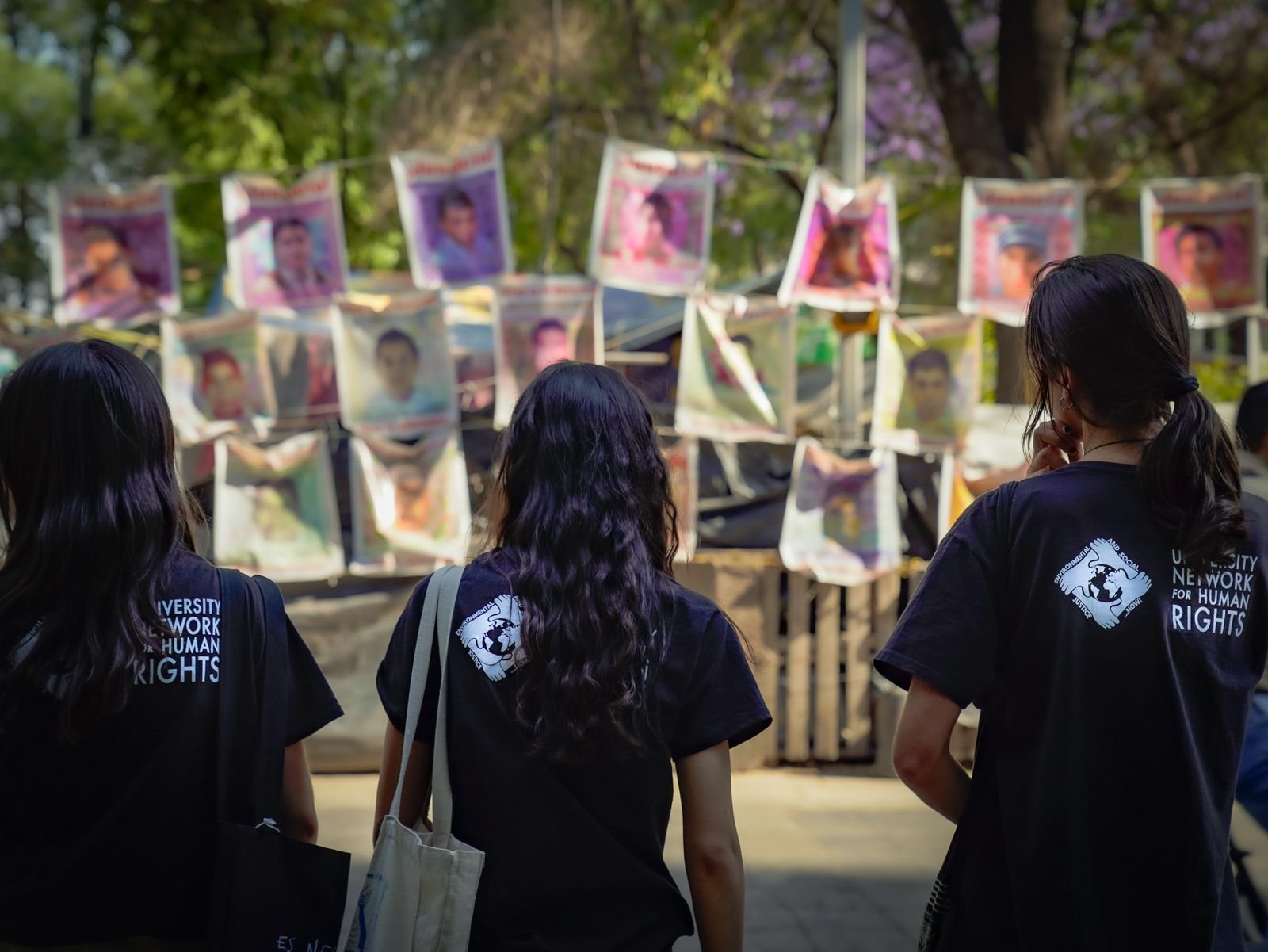Disappearances in Mexico
There are over 115,577 disappeared people in Mexico as of September 2024, according to Mexico's National Registry of Disappeared Persons. However, the Committee on Enforced Disappearances (CED) and the Working Group on Enforced or Involuntary Disappearances has noted that, “in many cases, disappearances go unreported, and thus the scale of this tragedy may even go beyond what is currently registered.”
UNHR through Arts Coordinator Mica Borovinsky and Yale students Leyly Moridi and Lucía Amaya Martínez at the Roundabout of the Disappeared (Glorieta de las personas desaparecidas), in Mexico City, Mexico (March 2024)
The broader context is one of near total impunity: Officials at every level of government are either directly responsible, complicit, or unable or unwilling to investigate reported disappearances. According to official information, as of November 2021, between 2 and 6 percent of cases of disappearance had been brought before the courts, and only 36 judgments had been issued in such cases at the national level. The vast majority of the disappeared are never found. Families of victims rarely discover the truth about what happened to their missing loved ones.
Drawing the Disappeared, by Mica Borovinsky
Seeking Truth:
UNHR Senior Advisor Sofía Galván, Human Rights through Arts Coordinator Mica Borovinsky, and students Lucía Amaya and Leyly Moridi with Luis Daniel Vázquez, researcher at the the Institute for Legal Research at the National Autonomous University of Mexico, UNAM. (Mexico City, March 2024)
UNHR has been supporting families and communities who are direct or indirect victims of disappearance, as well as those who live in fear of disappearance, in exercising the right to the truth (or right to know). Under UNHR supervision, students from Wesleyan and Yale traveled to Mexico in January 2024 to interview experts, leaders of colectivos, and family members of the disappeared to reconstruct the stories behind disappearances: where, when, and why people are taken; what happens to them while they are in captivity; as well as who is responsible for their capture, captivity, and, in many cases, death, and for the obstruction of investigation and access to justice. UNHR worked closely with Mexican organizations Técnicas Rudas and the colectivo Milynali Red.
Seeking Justice:
UNHR Senior Advisor Sofía Galván, Human Rights through Arts Coordinator Mica Borovinsky, and Yale students Lucía Amaya and Leyly Moridi with Karla Quintana, former head of the National Search Commission (Mexico City, March 2024)
Under the supervision of UNHR, Yale students traveled to Mexico for field documentation in March 2024. Additionally, the team engaged in desk research, analysis, and drafting of reports and other advocacy materials. As a result of the March documentation visit, we built and fortified relationships with community partners, including a leading organization on the subject, FUNDAR, and the Collective in Search of Truth and Justice (Colectivo en Búsqueda de Verdad y Justicia). We also produced a series of videos (cápsulas) and artworks highlighting the stories of missing people and the relatives searching for them. These were used to launch a social media campaign in the framework of the International Day of the Victims of Forced Disappearances (August 30), to pay tribute to the thousands of direct and indirect victims of enforced disappearances in Mexico. Our thread on X (Spanish) here. Student field research has additionally contributed to a submission on the disappearances to the Inter-American Commission on Human Rights, which will be producing a report on the matter.
Forthcoming student advocacy and public education materials include additional cápsulas, or short videos, sharing the stories of victims and their loved ones and GIS data visualizations of the geographic distribution of disappearances.
(Image descriptions from left to right)
1. UNHR Senior Advisor Sofía Galván and Yale students Lucía Amaya and Leyly Moridi with Piero Vásquez, international human rights expert (Mexico City, March 2024).
2. UNHR staff Sofia Galván and Mica Borovinsky, alongside Yale student Lucía Amaya, meet with Humberto Guerrero of FUNDAR, a leading human rights organization in Mexico. (Mexico City, March 2024)
3. UNHR Senior Advisor Sofía Galván, Human Rights through Arts Coordinator Mica Borovinsky, and Yale students Lucía Amaya and Leyly Moridi with Karla Quintana, former head of the National Search Commission (Mexico City, March 2024)









